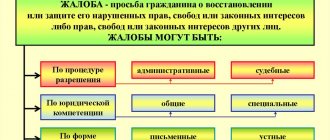Clients may complain about the quality of work and services. The obligations of the contractor in this case are specified in the Law on Consumer Rights. Exact execution of the law is the main protection of entrepreneurs from loss of money and abuse by customers.
We tell you what entrepreneurs should do to avoid paying penalties, moral damages and fines.
We will only talk about services and works. We wrote in another article how to accept a low-quality product from a consumer.
Submit reports in three clicks
Elba - online accounting for individual entrepreneurs and LLCs. The service will prepare reports, calculate taxes and free up time for useful things.
Try 30 days free Gift for new entrepreneurs A year on “Premium” for individual entrepreneurs under 3 months
Who is protected by consumer law?
Consumers are people who order paid services and work for themselves, their families, or as a gift to another person. They are protected by the law. Parents hire animators for a children's party - they are consumers.
Consumers have increased protection in case of delays and poor quality of service compared to services for entrepreneurs and legal entities. Consumers also have the right to cancel the contract at any time by paying the contractor its actual expenses under Art. 32 of the Law.
Customers of services and work for business are not consumers. The company paid for a corporate event for employees - there is no increased responsibility for the performer.
People who use free services are not consumers. The HOA organized a free party in the yard for residents - the rules for consumers do not work.
General information
The Law of the Russian Federation “On the Protection of Consumer Rights” (hereinafter referred to as the Law) clearly describes the rights of citizens who purchase services and the responsibilities of those who provide them.
Thus, the consumer has the right to:
- purchasing a quality product or service;
- obtaining truthful information (information about the manufacturer, quality, method, properties, etc.);
- harmlessness (any product or service must be safe for human health).
Often, for one reason or another, the contractor may not fulfill his obligations. The refusal is as follows:
- failure to provide agreed upon services;
- the work is not completed within the specified time frame;
- providing consumers with low-quality services.
The consequence of such actions may be termination of the contract by the consumer. Based on whose fault the services were not provided, the amount that the victim has the right to receive is calculated:
- if the customer canceled the contract before the start of work, he has the right to receive the entire amount paid (Article 32);
- when, at the initiative of the consumer, the agreement is terminated after the first work completed, the entire amount is returned except for the funds spent on the work;
- if the contractor did not provide services for reasons that are not valid, the customer has the right to return all the money paid, as well as to collect a penalty;
- in the event of force majeure situations, the established obligations are not fulfilled - costs are not returned to the consumer.
What is a deficiency in service and work
Work is the action of a performer with a material result for the consumer. A service is an action with a specific purpose for the consumer, but without a material result. Repair is work, haircut is a service.
A defect is when a work or service:
- does not comply with the purpose of use, the terms of the contract with the consumer or GOST and other similar requirements - Art. 4 Laws;
- unsafe for people and property - Art. 7 of the Law;
- not provided on time - art. 27 of the Law;
- provided without informing the customer about consumer properties, as a result of which the quality suffered - art. 10 and 12 of the Law.
An example of a deficiency: before the service was provided, the contractor did not provide the customer with comprehensive information about the trip
The family bought a tour to Vietnam. Upon arrival, it turned out that there was a noisy construction site next to the hotel, making it uncomfortable to rest. The tour operator did not warn about the construction either in instructions for tourists or on the official website. The court found this service to be of poor quality - case No. 33-15553/2016.
Example of a flaw: the service is not secure
A woman took her mink coat to the dry cleaner. Upon receipt, I saw that the fur fabric was torn in some places. They organized an examination and found out that the fabric had become thinner due to exposure to chemical solutions during cleaning. Such a service is unsafe for the consumer’s property - case No. 33-11921/2019.
A significant drawback is when the service or work result cannot be corrected, or it can, but it is expensive or pointless for the customer.
An example of a significant deficiency: the result of the work does not comply with the purpose of use and building regulations
A man ordered the installation of interior doors in a private house from the company. After installation, the door leaf became warped, cracks appeared and the doors began to jam - impossible to close. The examination showed that the work does not comply with the requirements of regulatory construction documentation and generally accepted methods of installing doors in wooden houses - case No. 33-21381/2018.
Article 37. Procedure and forms of payment for work performed (services provided)
(as amended by Federal Laws dated December 21, 2004 N 171-FZ, dated July 27, 2006 N 140-FZ)
The consumer is obliged to pay for the services provided to him in the manner and within the terms established by the agreement with the contractor.
(Part one as amended by Federal Law dated December 21, 2004 N 171-FZ)
The consumer is obliged to pay for the work performed by the contractor in full after its acceptance by the consumer. With the consent of the consumer, the work can be paid for by him at the conclusion of the contract in full or by issuing an advance.
(as amended by Federal Laws dated December 17, 1999 N 212-FZ, dated December 21, 2004 N 171-FZ)
Payment for services provided (work performed) is made through cash or non-cash payments in accordance with the legislation of the Russian Federation.
(Part three introduced by Federal Law dated July 27, 2006 N 140-FZ)
When using a cash form of payment, payment for goods (work, services) by the consumer is made in accordance with the instructions of the seller (performer) by depositing cash to the seller (performer), or to a credit institution, or to a payment agent engaged in accepting payments from individuals, or to a bank payment agent (subagent) operating in accordance with the legislation on banks and banking activities, unless otherwise established by federal laws or other regulatory legal acts of the Russian Federation. In this case, the consumer’s obligations to the seller (performer) to pay for goods (work, services) are considered fulfilled in the amount of funds deposited from the moment cash is deposited, respectively, to the seller (performer), or to a credit institution, or to a payment agent engaged in accepting payments individuals, or a bank payment agent (subagent) operating in accordance with the legislation on banks and banking activities.
(as amended by Federal Laws dated 06/03/2009 N 121-FZ, dated 06/27/2011 N 162-FZ)
Consumer rights in case of delay
Make a claim
When the contractor has provided services or carried out work in violation of the initial or final deadline under the contract, the customer makes a claim from Art. 28 of the Law:
- set a new deadline, write it down in the contract and bring the matter to an end;
— give the order to another contractor or complete it yourself and demand compensation for expenses;
— make a discount on your order;
- cancel the order and return the payment.
When the customer refuses the contract and does not accept the result, the contractor is not reimbursed for costs and the work is not paid. But if the result is accepted despite the delay, the consumer pays for it.
For example, a customer took a raincoat that was repaired later than expected. He must pay for the seamstress's services. If I hadn’t picked it up, there would have been no need to pay.
The requirement is chosen by the consumer, not the performer. It is impossible to limit the choice in the contract - Art. 16 of the Law.
Ask for damages
Along with the claim, the consumer has the right to ask for compensation for losses.
Calculate penalties
For violation of the deadline, the contractor pays a penalty in the amount of 3% of the price of the order or stage of work for each day of delay. This rule applies even if the newly established deadlines are violated. The total amount of the penalty cannot be greater than the price of the order or stage itself - Art. 28 of the Law.
When there is no responsibility
The contractor is relieved of all responsibility if he proves that the customer himself is to blame for the delay or that force majeure occurred - Art. 28 of the Law.
Article 31. Time limits for satisfying individual consumer requirements
- Consumer demands for a reduction in the price for work performed (service provided), for reimbursement of expenses to eliminate deficiencies in the work performed (service provided) on their own or by third parties, as well as for the return of the amount of money paid for the work (service) and compensation for losses caused in connection with with refusal to execute the contract, provided for in paragraph 1 of Article 28 and paragraphs 1 and 4 of Article 29 of this Law, are subject to satisfaction within ten days from the date of presentation of the corresponding demand. (as amended by Federal Law dated December 21, 2004 N 171-FZ)
- The consumer's demands for the free production of another thing from a homogeneous material of the same quality or for the repeated performance of work (provision of a service) are subject to satisfaction within the time limit established for urgent completion of the work (provision of a service), and if this period is not established, within the time limit specified provided for in the contract for the performance of work (provision of services), which was improperly executed.
- For violation of the deadlines for satisfying individual consumer requirements provided for in this article, the executor shall pay the consumer a penalty (fine) for each day of delay, the amount and procedure for calculation of which are determined in accordance with paragraph 5 of Article 28 of this Law.
In case of violation of the deadlines specified in paragraphs 1 and 2 of this article, the consumer has the right to present to the contractor other demands provided for in paragraph 1 of Article 28 and paragraphs 1 and 4 of Article 29 of this Law.
Consumer rights in case of deficiency in service and work
Make a claim
If the service is provided poorly or a defect is found in the manufactured item, the customer can make claims from Art. 29 of the Law:
— eliminate the defect free of charge;
— make a discount on your order;
— repeat the work or service free of charge with the return of the defective item to the contractor;
— give the order to another contractor or eliminate the defect yourself and demand reimbursement of expenses;
- refuse the order and return the payment - if the defect is significant or is not eliminated within the agreed period.
The requirement is chosen by the consumer, not the performer. Anything from this list cannot be prohibited by contract - Art. 16 of the Law.
For visible defects, the customer makes a claim during acceptance of the work or even during execution. For hidden ones - within the warranty period. Without a guarantee - within a reasonable period of two years, and five - when the result of the work is real estate.
To establish the presence of a defect in the work and its cause, an examination is carried out. While the guarantee is valid, the contractor pays for the examination. The customer shall reimburse the payment if it turns out that the defect in the work was caused by his fault. Without a guarantee, on the contrary: the customer pays, the contractor reimburses if the reason was due to improper execution of the work.
Ask for damages
The consumer has the right to ask for compensation for his losses that occurred due to poor quality of service or work.
Calculate penalties
For violation of the deadline due to elimination of deficiencies or repetition of work, the contractor pays the consumer a penalty in the amount of 3% of the price of the order or stage of work. Penalties cannot be calculated greater than the price of the order or its stage.
Article 35. Performing work from the material (with the thing) of the consumer
- If the work is performed entirely or partially from the consumer’s material (thing), the performer is responsible for the safety of this material (thing) and its correct use.
The performer is obliged:
- warn the consumer about the unsuitability or poor quality of the material (thing) transferred by the consumer;
- submit a report on the consumption of material and return the remainder.
In case of complete or partial loss (damage) of material (thing) accepted from the consumer, the contractor is obliged to replace it within three days with a homogeneous material (thing) of similar quality and, at the consumer’s request, produce a product from a homogeneous material (thing) within a reasonable time, and if in the absence of homogeneous material (things) of similar quality - reimburse the consumer twice the price of the lost (damaged) material (things), as well as the costs incurred by the consumer.
- The price of the lost (damaged) material (thing) is determined based on the price of the material (thing) that existed in the place where the consumer’s demand should have been satisfied by the contractor on the day of voluntary satisfaction of such a claim or on the day of the court decision, if the consumer’s demand is voluntary was not satisfied. The price of the material (item) transferred to the contractor is determined in the contract for the performance of work or in another document (receipt, order) confirming its conclusion. (as amended by Federal Law No. 212-FZ of December 17, 1999)
- The contractor is released from liability for the complete or partial loss (damage) of the material (thing) accepted by him from the consumer if the consumer is warned by the contractor about the special properties of the material (thing) that may entail its complete or partial loss (damage) or if the specified the properties of the material (thing) could not be detected upon proper acceptance of this material (thing) by the performer. (as amended by Federal Law No. 212-FZ of December 17, 1999)
Article 36. The duty of the contractor to inform the consumer about circumstances that may affect the quality of the work performed (service provided) or lead to the impossibility of completing it on time
(as amended by Federal Law No. 212-FZ of December 17, 1999)
The contractor is obliged to promptly inform the consumer that compliance with the consumer’s instructions and other circumstances depending on the consumer may reduce the quality of the work performed (service provided) or result in the impossibility of completing it on time.
(as amended by Federal Law No. 212-FZ of December 17, 1999)
If the consumer, despite timely and reasonable information by the contractor, does not replace unsuitable or substandard material within a reasonable time, does not change instructions on the method of performing work (providing a service) or does not eliminate other circumstances that may reduce the quality of the work performed (service provided), the contractor has the right to refuse to fulfill the contract for the performance of work (provision of services) and demand full compensation for losses.
(as amended by Federal Law dated December 21, 2004 N 171-FZ)
What happens if consumer rights are violated?
When work is completed late or the result is of poor quality, it is important to satisfy all consumer requirements. For example, to repair the product and compensate for losses. Or repeat the service and pay late fees.
Otherwise, the consumer has the right to complain to Rospotrebnadzor and apply for payments to the court.
Fine from Rospotrebnadzor
The customer can complain to Rospotrebnadzor, and they will come to the contractor to check.
For providing poor-quality services to the population, you will be fined under Art. 14.4 Code of Administrative Offenses of the Russian Federation. The fine for entrepreneurs is from 10,000 to 20,000 rubles, for organizations - from 20,000 to 30,000 rubles.
For the lack of complete information about the service and violation of other consumer rights, consumers are fined under Art. 14.8 Code of Administrative Offenses of the Russian Federation. For a company, a fine ranges from 5,000 to 20,000 rubles.
Lawsuit from the customer
If the customer knows his rights well, and the contractor does not satisfy them, he will go to court. A persistent consumer can even sue for penalties or damages when the main claim has been satisfied. Therefore, it is more profitable for the contractor to monitor compliance with deadlines and try to negotiate compensation for losses or free repetition of the service than to bring the matter to a lawsuit.
According to a court decision in favor of the consumer, the contractor will have to pay:
- the principal debt at the price on the day of the decision, that is, possibly more than the original price;
— losses;
— late fee 3% of the order price;
- moral damage under Art. 15 of the Law;
— consumer expenses for examination and lawyers;
- a fine in the amount of half the awarded amount under Art. 13 of the Law.
Example: the company paid the consumer twice as much as the customer asked for before the trial
The man ordered disinfection from insects in his apartment from the company and paid 2,500 rubles. Workers came and treated the walls with disinfectants. After two months, the wallpaper and baseboards in the rooms turned black. The man called the experts. Experts have determined that the darkening appeared due to disinfectants; the cost of repairs is 37,898 rubles. The man demanded this money from the company as damages. The company refused, so the man went to court and won.
The court recovered from the company:
- 2,500 rubles payment - you don’t have to pay for low-quality service;
- 37,898 rubles in losses - the process of providing the service was unsafe;
- 1,125 rubles penalty - for violating the ten-day deadline for compensation of losses;
- 1000 rubles - moral damage;
— 5,000 rubles — for payment of the examination;
— 1,700 rubles — for paying for a power of attorney for a lawyer in court;
— 20,699 rubles — a fine for refusing to pay for repairs in an apartment without going to court;
- 1475 rubles - state duty.
Now the company will pay 71,397 rubles instead of 37,898 rubles.
Case No. 33-2240/2017.
Reasons for returning money for poor quality service
It is wise to terminate cooperation and demand a refund for poor-quality service
Firstly, you need to know that it will be impossible to simply refuse to complete work that has already begun. In addition, if a defect was discovered in the service provided, this is also not a basis for immediate termination of the contract and a refund for poor-quality service . The most important thing that needs to be done when a violation is detected or a defect is found in the service is to provide the contractor with additional time to eliminate the cause of dissatisfaction, while the contract specifies a specific date by which all defects must be corrected. In the event that your claims are not satisfied within the agreed time frame, this will be grounds for termination of cooperation and a demand for a refund for poor-quality service .
Another reason under which the consumer has the legal right to unilaterally terminate cooperation with the contractor is the presence of any deviations by the latter from the primary terms of the contract. If such violations are discovered, the consumer may demand a refund for poor-quality service .
The last serious reason that can cause a severance in the relationship between the buyer and the contractor and the desire to return money for a poor-quality service is the discovery of significant deficiencies after the delivery of the result of the work. The following disadvantages are considered significant:
- Defects, the elimination of which will cost an amount much greater than or approximately equal to the amount of provision of the service itself;
- If the period assigned to eliminate the defect exceeds the period of time agreed upon by the parties and will be disadvantageous to the buyer.
Thus, if you find significant violations, you can easily refuse to cooperate with this contractor and demand a refund for poor-quality service .
How to avoid disputes with consumers
We told you how to act if the consumer has already made demands on the timing and quality of the service. But it is better for an entrepreneur to protect himself in advance from disputes with clients:
- Set deadlines for completing work with reserve in the contract. It is better to deliver the result early and please the customer than to be late and pay penalties and losses.
- Comply with GOSTs, as well as technical specifications and other written agreements with the client. Take care of the safety of the service process and work. Service of impeccable quality is reliable protection against consumer abuse of their rights.
- If the consumer nevertheless makes a justified claim, satisfy his demands within the legal time limit. If there is a disagreement, try to come to an agreement, offer a free bonus or something similar. Don’t bring it to court, complaints and fines.
Article 34. Performing work from the performer’s material
- The contractor is obliged to perform the work specified in the contract for the performance of work, using his own materials and his own means, unless otherwise provided by the contract. (as amended by Federal Law No. 212-FZ of December 17, 1999) The contractor who provided the material to perform the work is responsible for its inadequate quality in accordance with the rules on the seller’s liability for goods of inadequate quality.
(as amended by Federal Law No. 212-FZ of December 17, 1999)
- The contractor's material is paid by the consumer upon conclusion of the specified contract in full or in the amount specified in the contract for the performance of work with the condition of final payment upon receipt by the consumer of the work performed by the contractor, unless a different procedure for payment for the contractor's material is provided for by agreement of the parties. (as amended by Federal Law No. 212-FZ of December 17, 1999)
- In cases provided for in the work contract, the material may be provided by the contractor to the consumer on credit. A subsequent change in the price of the contractor's material provided on credit does not entail recalculation.
(as amended by Federal Law No. 212-FZ of December 17, 1999)
- The contractor's materials and the technical means, tools, etc. necessary to perform the work are delivered to the place where the work is performed by the contractor.
On the application of the provisions of Article 35 to relations under a contract related to the provision of services for dry cleaning of products, see letter of Rospotrebnadzor dated 03/07/2006 N 0100/2473-06-32.










